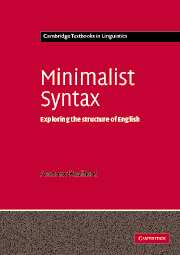10 - Phases
Published online by Cambridge University Press: 05 June 2012
Summary
Overview
In this chapter, we look at recent work by Chomsky suggesting that syntactic structure is built up in phases (with phases including CP and transitive vP). At the end of each phase, part of the syntactic structure already formed undergoes transfer to the phonological and semantic components, with the result that the relevant part of the structure is inaccessible to further syntactic operations from that point on. (An important point of detail to note is that since we are outlining Chomsky's ideas on phases here, we shall follow his assumptions about the structure of verb phrases and expletive structures.)
Phases
In §8.5, we outlined Chomsky's claim in recent work that all syntactic operations involve a relation between a probe P and a local goal G which is sufficiently ‘close’ to the probe (or, in the case of multiple agreement, a relation between a probe and more than one local goal). We noted Chomsky's (2001, p. 13) remark that ‘the P, G relation must be local’ in order ‘to minimise search’, because the Language Faculty can only hold a limited amount of structure in its ‘active memory’ (Chomsky 1999, p. 9). Accordingly, syntactic structures are built up one phase at a time. Chomsky suggests (1999, p. 9) that phases are ‘propositional’ in nature, and include CP and transitive vP (more specifically, vP with an external argument, which he denotes as v*P).
Information
- Type
- Chapter
- Information
- Minimalist SyntaxExploring the Structure of English, pp. 381 - 431Publisher: Cambridge University PressPrint publication year: 2004
